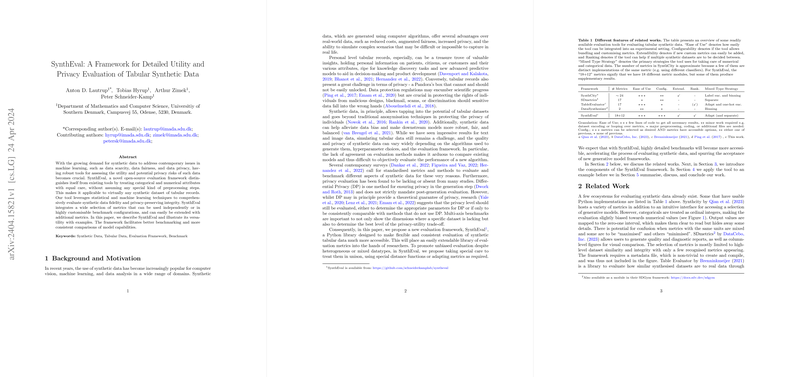Evaluating the Utility and Privacy of Synthetic Tabular Data with SynthEval
Background and Motivation
The creation of synthetic data has gained popularity as an alternative to real-world datasets for purposes that require privacy preservation, such as in sensitive fields like healthcare. Synthetic data can emulate real-world properties without compromising personal privacy, making it a valuable resource in data science. However, the challenge lies in adequately evaluating both the utility and privacy of synthetic data to ensure its effectiveness and safety. Addressing this need, the paper introduces SynthEval, a comprehensive Python-based open-source framework that evaluates synthetic tabular data across numerous dimensions, including utility and privacy.
Related Work in Evaluation Frameworks
The paper discusses existing evaluation tools like SynthCity and SDmetrics, highlighting issues around ease of use and adaptability, particularly when handling mixed-type data (numerical and categorical). Most tools offer limited customization and require extensive setup, which constrains their effectiveness across diverse datasets. SynthEval addresses these limitations by providing a flexible, easily extendable tool with built-in capabilities to handle mixed data types, revealing a significant enhancement over previous methods.
SynthEval Framework Description
SynthEval distinguishes itself with several innovative features. Key among these is its dual capability to evaluate both privacy and utility through a variety of metrics. The framework allows for extensive customization, enabling users to tailor evaluations based on specific needs.
- Metrics Customization: Includes 30 metrics, supporting evaluations that prioritize aspects like correlation differences, mutual information, and identifiable risk. Each metric is adaptable, catering to various data types and evaluation goals.
- Benchmarking and Extensibility: Users can benchmark multiple datasets simultaneously with results aggregated in a comprehensible format that ranks synthetic datasets against key metrics. Additionally, SynthEval is designed for easy integration of new custom metrics.
- Detailed Reporting: Beyond numeric summaries, SynthEval can generate detailed reports and visual aids to assist in interpreting evaluation results, aiding stakeholders in making informed decisions about synthetic data usability.
Privacy and Utility Trade-offs
The application of SynthEval is illustrated through an example that involved generating synthetic data via several methods including GANs and Bayesian networks. By leveraging SynthEval, researchers could discern not only the utility and privacy levels of each method but also optimize them by adjusting generation parameters.
Implications and Future Directions
The introduction of SynthEval could significantly advance how researchers and practitioners in various fields assess and utilize synthetic data. Its flexibility and extensive metric library facilitate a more nuanced understanding of synthetic data's performance, paving the way for broader adoption and trust in synthetic datasets.
There is potential for future work to expand SynthEval's metric library, enhance its usability, and refine its adaptability across more diverse dataset conditions. Continued development and community involvement are crucial to maintaining its relevance and effectiveness in dynamic research and application landscapes.
In summary, SynthEval presents a robust framework for the detailed evaluation of synthetic tabular data, addressing both utility and privacy comprehensively. Its approach sets a new standard in the field, potentially aiding numerous projects and research initiatives that rely on high-quality, privacy-preserving synthetic data.
